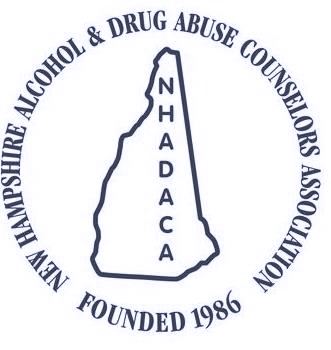Treatment Webinars
Webinars are free for anyone to participate without a certificate.
NHADACA MEMBERS:
Free upon successful completion of quiz and webinar evaluation.
NON-MEMBERS:
$15 upon successful completion of quiz and webinar evaluation.
Note: To receive your certificate of completion please ensure you have completed the following:
- Registration
- Watched the Webinar
- Successfully passed the Quiz with an 80% or higher
- Completed the Webinar Evaluation
- Email training@nhadaca.org to inform the training staff that you completed steps 1-4. (You do not have to attach quiz results or evaluations)
- Certificates will be available for download in your NHADACA account within 10 business days from the date of your email. For instructions on how to download your certificate click here
If you run into any technical difficulties please give us a call at 603-225-7060 or email us at training@nhadaca.org.
The Clinical Detective: How to Discover and Treat Hidden Gambling Problems 

Presenters: Jeremy Wampler, LCSW, ICGC II, BACC, CGT, LADC & Fiorigio (Fred) Fetta, LPC, ICGC-II, BACC, AADC
July 2023
As a result of this webinar participants will be able to:
- List a minimum of two (2) reasons it is important to include gambling awareness into practice in treatment and prevention programs.
- Identify three (3) ways to integrate gambling within an assessment.
- Describe a treatment intervention to assist clients working through a gambling disorder.
STEP 1: REGISTER STEP 2: WATCH NOW STEP 3: QUIZ STEP 4: EVALUATION STEP 5: EMAIL NHADACA
Understanding, Identifying, And Screening For Problem Gambling

Presenters: Ed Talbot and Angela Bergen, PhD

February 2023
As a result of this webinar participants will be able to:
- Understand what problem gambling is and its similarities and differences with a substance use disorder;
- Recognize signs indicating problem gambling;
- Describe screening techniques to identify a gambling problem; and
- Examine the resources available for individuals struggling with problem gambling.
STEP 1: REGISTER STEP 2: WATCH NOW STEP 3: QUIZ STEP 4: EVALUATION STEP 5: EMAIL NHADACA
Core Function IX: Client Education

Presenter: Kelly Luedtke, M.Ed., CAGS, MLADC
November 2022
As a result of this webinar participants will be able to:
- Access resource material for client education.
- Develop an educational assessment for the client.
- Design a learning program for the client.
- Understand the global criteria associated with the core function of client education.
STEP 1: REGISTER STEP 2: WATCH NOW STEP 3: QUIZ STEP 4: EVALUATION STEP 5: EMAIL NHADACA
Addressing Motivation and the Process of Change in Group Treatment - Part 1 

Presenter: Dr. Carlo DiClemente, Ph.D., ABPP
March 2022
As a result of this webinar participants will be able to:
- List the active mechanisms related to the individual Process of Change
- Explain why all interventions require behavior change
- Describe the Process of Change
STEP 1: REGISTER STEP 2: WATCH NOW STEP 3: QUIZ STEP 4: EVALUATION STEP 5: EMAIL NHADACA
Addressing Motivation and the Process of Change in Group Treatment - Part 2 

Presenter: Dr. Carlo DiClemente, Ph.D., ABPP
March 2022
As a result of this webinar participants will be able to:
- Explain pros and cons of individual MI and group MI in the Change Process
- Describe ways we can see indications someone is in the early stages of the process or the later stages.
- List ways to diffuse resistance in groups.
STEP 1: REGISTER STEP 2: WATCH NOW STEP 3: QUIZ STEP 4: EVALUATION STEP 5: EMAIL NHADACA
Tobacco Use and Health Impact 


Presenter: Albee Budnitz, MD
December 2021
As a result of this webinar participants will be able to:
- Identify why tobacco product use is a population, public health and societal problem;
- Understand nicotine and nicotine addiction; and how it relates to tobacco products; and
- Become aware of what can be done about it and resources to do it.
STEP 1: REGISTER STEP 2: WATCH NOW STEP 3: QUIZ STEP 4: EVALUATION STEP 5: EMAIL NHADACA
Effects of Opioids on the Human Brain - Part 1


Presenter: Dr. Leila Jabour
August 2021
As a result of this webinar participants will be able to:
- Describe the parts of the reward system of the brain.
- Explain effects of opioid use on the brain’s reward circuit.
- List the chemical the brain releases in the reward system of the brain.
STEP 1: REGISTER STEP 2: WATCH NOW STEP 3: QUIZ STEP 4: EVALUATION STEP 5: EMAIL NHADACA
Effects of Opioids on the Human Brain - Part 2 


Presenter: Dr. Leila Jabour
August 2021
As a result of this webinar participants will be able to:
- Describe the difference between tolerance and dependence.
- Explain how opioids effects the different parts of the brain.
- Discuss opioids’ long-lasting impact on overall brain function
STEP 1: REGISTER STEP 2: WATCH NOW STEP 3: QUIZ STEP 4: EVALUATION
Core Function VIII: Crisis Intervention

Presenter: Kelly Luedtke, MLADC
June 2021

As a result of this webinar participants will be able to:
- Understand the IC&RC’s definition of Crisis Intervention;
- Understand the IC&RC’s Global Criteria of Crisis Intervention; and
- Be knowledgeable in three different coping skills to help a client calm down.
STEP 1: REGISTER STEP 2: WATCH NOW STEP 3: QUIZ STEP 4: EVALUATION STEP 5: EMAIL NHADACA
TRUST: Treatment for Stimulant Use Disorder: Maximizing Evidence Based Practices
Presenter: Albert Hasson, MSW

April 2021
As a result of this webinar participants will be able to: 
- Identify clinical challenges for individuals with methamphetamine use disorders;
- Learn about the benefits and challenges of Contingency Management (Motivational Incentives) strategy;
- Learn about the benefits and challenges of Community Reinforcement Approach;
- Learn about the benefits and integration of exercise in treatment; and
- Learn about TRUST: An integrated behavioral Model.
STEP 1: REGISTER STEP 2: WATCH NOW STEP 3: QUIZ STEP 4: EVALUATION STEP 5: EMAIL NHADACA
Medications for Addiction Recovery in Recovery Housing

Presenters: Mike Gaudet, LICSW, Cheryle Pacapelli, Krystle Urban, Emily Atwood, Dr. Ernie Fletcher and Milena Stott
April 2021 
As a result of this webinar participants will have an understanding of:
- Understand the science of how the brain is affected by substance use disorders and why MAT is critical in mediating recovery;
- Discover the impediments to implementing MAT in RH and some steps to address concerns and consideration; and
- Learn from those with first-hand experience the value of integrating MAT in RH.
STEP 1: REGISTER STEP 2: WATCH NOW STEP 3: QUIZ STEP 4: EVALUATION STEP 5: EMAIL NHADAC
 ASAM Just the Basics
ASAM Just the Basics
Presenter: Paul Kiernan, LADC
April 2021
You'll learn:
- The spirit of ASAM, a basic understanding of the 6 dimensions and levels of care;
- Be able to identify the different levels of care; and
- Better understand how an assessment can be used for care planning.
STEP 1: REGISTER STEP 2: WATCH NOW STEP 3: QUIZ STEP 4: EVALUATION STEP 5: EMAIL NHADACA
Harm Reduction: Preventing Death, Disease and Suffering 


Presenter: Ryan Fowler
March 2021
As a result of this webinar participants will have an understanding of: 
- Current drug trends, evidence-based interventions for drug use, overdose prevention strategies, naloxone administration;
- How, with harm reduction, all drug-related death is preventable; and
- The intersectionality of {Prevention, Intervention, Treatment, and Recovery} with Harm Reduction.
STEP 1: REGISTER STEP 2: WATCH NOW STEP 3: QUIZ STEP 4: EVALUATION STEP 5: EMAIL NHADAC
Addicted to Fear

Presenter: Joseph Zannella
May 2020

As a result of this webinar participants will be able to:
- Learn the biological basis for Fear and why it can become attractive.
- Learn similarities and differences between fear addiction and other addictions.
- Explain possible treatment for individuals addicted to the adrenaline rush.
- Explore supportive medications and treatments.
STEP 1: REGISTER STEP 2: WATCH NOW STEP 3: QUIZ STEP 4: EVALUATION STEP 5: EMAIL NHADACA
Harm Reduction 


Presenter: Haner Hernandez
March 2020

As a result of this webinar participants will be able to:
- Describe the philosophy, principles, and practice of harm Reduction;
- Describe at least 2 techniques and strategies for engaging people in Harm Reduction;
- Describe Disparities and Equity;
- Describe their role in promoting, supporting and sustaining meaningful change; and
- Name at least 2 resources for Harm Reduction.
STEP 1: REGISTER STEP 2: WATCH NOW STEP 3: QUIZ STEP 4: EVALUATION STEP 5: EMAIL NHADACA
 Addressing Compassion Fatigue in Clinical Supervision
Addressing Compassion Fatigue in Clinical Supervision
Presenter: Angela Jones
November 2019

As a result of this webinar participants will be able to:
- Learn effective evidence-informed practices to reduce compassion fatigue risks
- Learn how to bring evidence-informed techniques into clinical supervision sessions that address compassion fatigue and burnout through effective clinician self-care as well as clinical practice that assures patient safety
STEP 1: REGISTER STEP 2: WATCH NOW STEP 3: QUIZ STEP 4: EVALUATION STEP 5: EMAIL NHADACA
 Core Function VI: Counseling
Core Function VI: Counseling
Presenter: Kelly Luedtke, MEd., CAGS, MLADC
March 2019

You'll learn to:
- Understand the need for effective treatment planning
- Understand the global criteria associated with this core function
- Describe group counseling principles
- Learn techniques associated with different stages of change
- Understand the characteristics of an effective counselor
STEP 1: REGISTER STEP 2: WATCH NOW STEP 3: QUIZ STEP 4: EVALUATION STEP 5: EMAIL NHADACA
Vaping and Marijuana


Presenter: Lee Anne Dodge

You'll learn:
- Become more familiar with vaping/e-cigarette devices and marketing strategies.
- About the risks of nicotine and marijuana on the developing brain.
- About prevention, intervention, and treatment strategies to address the growing concern regarding youth use.
STEP 1: REGISTER STEP 2: WATCH NOW STEP 3: QUIZ STEP 4: EVALUATION STEP 5: EMAIL NHADACA
 Core Function VII: Case Management
Core Function VII: Case Management
Presenter: Kelly Luedtke, MEd., CAGS, MLADC
March 2019

You'll learn to:
- Describe the requirements of case management
- Understand the global criteria associated with the core function of case management.
- Explain the rationale of case management activities to the client.
STEP 1: REGISTER STEP 2: WATCH NOW STEP 3: QUIZ STEP 4: EVALUATION STEP 5: EMAIL NHADACA
24/7 Connectedness to Technology - It's Impact on Human Development and It's Role in Anxiety and Depression


Presenter: Ann Duckless

January 2019
As a result of this webinar participants will be able to:
- Discuss research related to the use of technology, its impact and implications for connectedness and communication with people.
- Describe findings related to exposure of blue screen emissions on the neuroscience of the brain and effects on sleep patterns.
- Explain the correlation of connectedness to technology to the signs and symptoms of anxiety and depression in you
STEP 1: REGISTER STEP 2: WATCH NOW STEP 3: QUIZ STEP 4: EVALUATION STEP 5: EMAIL NHADACA
Increasing Hepatitis C Knowledge for Behavioral Health Providers


Presenter: Haner Hernandez-Bonilla, PhD, CPS, CADCA II, LADC I
December 2018
 As a result of this webinar participants will be able to:
As a result of this webinar participants will be able to:
- List at least three populations at-risk for hepatitis C infection
- Explain the difference between acute and chronic hepatitis C infection
- Discuss at least two reasons why it is important to promote hepatitis C screening and testing
- List treatment factors to consider and describe at least two new treatment options available to for patients with HCV
- Provide examples of strategies to link persons infected with HCV to health care
STEP 1: REGISTER STEP 2: WATCH NOW STEP 3: QUIZ STEP 4: EVALUATION STEP 5: EMAIL NHADACA
Cultural Competency: Communicating Across Boundaries 


Presenter: James Figueiredo, MEd.
November 2018
As a result of this webinar participants will be able to:
- Provide a basic understanding of cultural competence.
- Increase understanding of the framework and rationale for culturally responsive care.
- Examine individual and organizational barriers to cultural competence.
- Build understanding of cultural perspectives on substance use.
STEP 1: REGISTER STEP 2: WATCH NOW STEP 3: QUIZ STEP 4: EVALUATION STEP 5: EMAIL NHADACA
Acudetox

Presenter: Laura Cooley
June 2018

You'll learn:
- What Acudetox is
- Become familiar with how the safe application of 5 point ear acupuncture treatment and the protocol for successful integration.
- Understand the law that allows the use of AcuDetox by those trained in the National Acupuncture Detoxification Association (NADA) for the purposes of Behavioral Health in NH.
STEP 1: REGISTER STEP 2: WATCH NOW STEP 3: QUIZ STEP 4: EVALUATION STEP 5: EMAIL NHADACA
Medication Assisted Treatment

Presenter: Michael Gaudet, LICSW, LCDP
May 2018

You'll learn:
- Medications that are approved in the treatment of substance abuse recovery.
- To identify no fewer than three strategies for effective counseling intervention.
- To identify attitudinal challenges that present with the use of medication in.
STEP 1: REGISTER STEP 2: WATCH NOW STEP 3: QUIZ STEP 4: EVALUATION STEP 5: EMAIL NHADACA
 Opioid Addiction & Treatment: Understanding the Disorder, Treatment, and Protocol
Opioid Addiction & Treatment: Understanding the Disorder, Treatment, and Protocol
Presenter: Michael Gaudet, LICSW, LCDP
December 2017

You'll learn:
- History of opioid treatment in the United States;
- The laws regarding treatment of opioid addiction and the implications for the treatment system;
- How medication will benefit the delivery of opioid treatment and the types of medications used to treat opioid use disorder; and
- About the demographics of people affected by opioid use disorder.
STEP 1: REGISTER STEP 2: WATCH NOW STEP 3: QUIZ STEP 4: EVALUATION STEP 5: EMAIL NHADACA
Helping Individuals at Risk of Suicide


Presenter: Ann Duckless
December 2017
 As a result of this webinar participants will be able to:
As a result of this webinar participants will be able to:
- Gain knowledge of National Best Practices for community response to suicide thoughts, disclosures, and attempts.
- Learn the risk and protective factors and warning signs for suicide
- Gain insights into suicide data and how age, gender, culture and other demographic and diversity factors impact suicide risk
- Learn skills for intervening with community members at risk and connecting them with appropriate resources
- Gain awareness of community resources and services and how they can be utilized for persons at risk
STEP 1: REGISTER STEP 2: WATCH NOW STEP 3: QUIZ STEP 4: EVALUATION STEP 5: EMAIL NHADACA
Basics of HIV 


Presenter: James Figueiredo
July 2017
As a result of this webinar participants will be able to:
- Learn about HIV risk associated with sexual behaviors and substance use
- Gain knowledge about HIV prevention methods
- Understand the impact of HIV on the individual and community.
STEP 1: REGISTER STEP 2: WATCH NOW STEP 3: QUIZ STEP 4: EVALUATION STEP 5: EMAIL NHADACA
Postvention: How to Promote Healing and Reduce Risk After a Sudden Death or Suicide
Presenter: Ann Duckless


May 2017

You will:
- Gain an awareness of the impact of suicide and recognize warning signs of individuals who may be at increased risk after a suicide.
- Understand the grief that results after a suicide and learn ways to enhance coping for oneself and/or others after a loss.
- Understand best practice protocols for communication and access to resources after a suicide that may reduce further risk, and support healing for an agency or community impacted by a loss.
STEP 1: REGISTER STEP 2: WATCH NOW STEP 3: QUIZ STEP 4: EVALUATION STEP 5: EMAIL NHADACA
Introduction to Psychopharmacology

Presenter: Joanne McKenna, RN, LADC
May 2017
 Psychopharmacology for Substance Abuse Counselors is an introduction to the current research informing psychiatric treatment of major psychiatric disorders to include Depression, Bipolar Disorder, Anxiety Disorders and ADHD.
Psychopharmacology for Substance Abuse Counselors is an introduction to the current research informing psychiatric treatment of major psychiatric disorders to include Depression, Bipolar Disorder, Anxiety Disorders and ADHD.
Various classes of drugs will be discussed as well as the brain chemistry associated with their mechanism of action and basis of side effects.
STEP 1: REGISTER STEP 2: WATCH NOW STEP 3: QUIZ STEP 4: EVALUATION STEP 5: EMAIL NHADACA
Trans-Theoretical Model- Stages of Change


Presenter: Haner Hernández
May 2017

You'll learn:
- About the Substance Use Disorders challenges faced by individuals, families, and communities
- The Stages of Change and key characteristics of each stage
- The role of the stages of change in promoting, supporting and sustaining change
STEP 1: REGISTER STEP 2: WATCH NOW STEP 3: QUIZ STEP 4: EVALUATION STEP 5: EMAIL NHADACA
Transgender 101: What Substance Use Counselors Need to Know

Presenter: Gia Drew
May 2017

You'll learn:
- What it means to be Transgender by learning and hearing about the experiences of transgender people;
- The language and terminology related to Transgender people, including the differences between Sex and Gender;
- What Transitioning means to each person
- Best practices to use when interacting with a Transgender person.
STEP 1: REGISTER STEP 2: WATCH NOW STEP 3: QUIZ STEP 4: EVALUATION STEP 5: EMAIL NHADACA
Trauma-Sensitive Mindfulness-Based Recovery Maintenance

Presenter: Angela Jones
May 2017
 Thousands of studies have documented the physical and mental health benefits of mindfulness in general and is inspiring programs to adapt Mindfulness based models for schools, prisons, hospitals, veterans centers, and beyond. The relevance as a recovery maintenance skill for addictions is particularly significant because it is a skill of self-awareness - the first step into recovery. Mindfulness skills can assist in unraveling the complexity that often comes with addiction in the form of co-occurring symptoms.
Thousands of studies have documented the physical and mental health benefits of mindfulness in general and is inspiring programs to adapt Mindfulness based models for schools, prisons, hospitals, veterans centers, and beyond. The relevance as a recovery maintenance skill for addictions is particularly significant because it is a skill of self-awareness - the first step into recovery. Mindfulness skills can assist in unraveling the complexity that often comes with addiction in the form of co-occurring symptoms.
This webinar will briefly review the research, relevance to effective trauma-sensitive practices, and provide three mindful practices with a script to try for yourself and with your clients or students.
STEP 1: REGISTER STEP 2: WATCH NOW STEP 3: QUIZ STEP 4: EVALUATION STEP 5: EMAIL NHADACA
 Core Function V: Treatment Planning
Core Function V: Treatment Planning
Presenter: Kelly Luedtke, MEd, CAGS, MLADC
May 2017

You'll learn to:
- Understand the need for effective treatment planning
- Understand the global criteria associated with this core function
- Construct an individualized treatment plan
- Identify problem statements that are client-centered
-
Identify “SMART” and “SMARTER” goals and objectives
STEP 1: REGISTER STEP 2: WATCH NOW STEP 3: QUIZ STEP 4: EVALUATION STEP 5: EMAIL NHADACA
 Core Function II: Understanding Intake
Core Function II: Understanding Intake
Presenter: Kelly Reardon-Luedtke
May 2017

You'll learn:
- Proper components and methods of filling out releases of information with clients
- How to address possible treatment barriers during intake
- About the beginning components of the clinical interviewing process, gathering data, and building rapport and empathy
STEP 1: REGISTER STEP 2: WATCH NOW STEP 3: QUIZ STEP 4: EVALUATION STEP 5: EMAIL NHADACA
Core Function I: Understanding Screening 


Presenter: Kelly Reardon-Luedtke
May 2017

You'll learn:
- The signs and symptoms of substance abuse
- The difference between eligible and appropriate for an agency's program
- The laws, regulations, policies surrounding the treatment of substance use disorders
- How to be a skillful listener
- Keeping necessary records during the screening process
STEP 1: REGISTER STEP 2: WATCH NOW STEP 3: QUIZ STEP 4: EVALUATION STEP 5: EMAIL NHADACA
Co-Occurring Disorders in Youth Offering Hope and Help with Mental Health and Substance Misuse 


Presenter: Ann Duckless
August 2016

You'll learn:
- The signs and symptoms of thought and mood disorders and how to effectively intervene.
- The complexity of co-occurring disorders, with the intersection of mental health and substance misuse challenges.
- Of treatment implications when involving trauma and loss.
The goal of this workshop is to introduce attendees to the performance domains of the CRSW credential: Ethical Responsibility, Advocacy, Mentoring & Education, Recovery & Wellness Support.
STEP 1: REGISTER STEP 2: WATCH NOW STEP 3: QUIZ STEP 4: EVALUATION STEP 5: EMAIL NHADACA
 Core Function IV: Assessment
Core Function IV: Assessment
Presenter: Kelly Luedtke
July 2016

You'll learn to:
- Identify characteristics of substance use disorders
- Identify co-occurring mental health problems associated with substance use
- Understand Global Criteria associated with the core function of assessment
- Describe assessment procedures and commonly used assessment tools
- Describe ASAM-6 Dimensions
STEP 1: REGISTER STEP 2: WATCH NOW STEP 3: QUIZ STEP 4: EVALUATION STEP 5: EMAIL NHADACA
Motivational Interviewing Basic


Presenter: Stephen Andrew, LCSW, LADC, CCS
April 2016

You'll learn:
- Describe three aspects of the spirit of motivational interviewing
- Explain the difference between MI and client-centered
- Recognize the ability to respond to clients with empathic reflective statements
- Identify change talk within client speech
- Recognize open questions designed to elicit change talk
- Provide an empathic summary statement collecting change talk
- Describe a procedure to screen potential counselors for empathic skill
STEP 1: REGISTER STEP 2: WATCH NOW STEP 3: QUIZ STEP 4: EVALUATION STEP 5: EMAIL NHADACA
 Core Function III: Orientation
Core Function III: Orientation
Presenter: Kelly Reardon-Luedtke
March 2016

You'll learn:
- Know the steps for the orientation process.
- Understand the Global Criteria associated with the core function of orientation.
- Describe the ASAM levels of care.
- Describe the client’s rights that are applicable to the treatment program.
STEP 1: REGISTER STEP 2: WATCH NOW STEP 3: QUIZ STEP 4: EVALUATION STEP 5: EMAIL NHADACA
Therapeutic Approaches to Managing Withdrawal

Presenter: Theresa Gleason

December 2015
You'll learn to:
- Name the signs and symptoms of acute withdrawal
- Identify detoxification protocols for the management of acute withdrawal
- Explain the role of comfort medications in the treatment of withdrawal
STEP 1: REGISTER STEP 2: WATCH NOW STEP 3: QUIZ STEP 4: EVALUATION STEP 5: EMAIL NHADACA
 Personality Disorders Borderline and Antisocial
Personality Disorders Borderline and Antisocial
Presenter: Joseph Zannella
December 2015

You'll learn:
- How to effectively determine differential diagnosis of the personality disorders identified in the DSM-5
- An understanding of how personality disordered functioning develops as it relates to differentiating which symptoms of normal personality functioning are exacerbated in abnormal psychopathology
- To be able to discuss diagnostic criteria along a dimensional model of personality functioning
- Techniques on how to effectively treat these two personality disordered individuals
STEP 1: REGISTER STEP 2: WATCH NOW STEP 3: QUIZ STEP 4: EVALUATION STEP 5: EMAIL NHADACA
The Connections Between Substance Misuse and Suicide


Presenter: Ann Duckless
November 2014

You'll learn:
- Prevalence rates of suicide attempts by people who misuse substances.
- Prevalence rates of suicide for specific drugs.
- Contributing bio-psycho-social factors that lead to substance misuse and suicide, including the role of cultural, racial, gender, and spiritual diversity.
- Cutting-edge prevention and intervention approaches to be used by mental health and substance abuse professionals.
STEP 1: REGISTER STEP 2: WATCH NOW STEP 3: QUIZ STEP 4: EVALUATION STEP 5: EMAIL NHADACA
Using SBIRT in Your Practice


Presenter: Misti Storie
August 2013
You'll learn:
-
Screen clients for unhealthy alcohol use with brief, valid questionnaires such as the AUDIT-C and the AUDIT;
-
Deliver effective brief counseling informed by Motivational Interviewing and the Stages of Change;
-
Link clients to medical or specialty addiction treatment services as needed, and work with physicians and other specialists in ongoing care coordination; and
-
Provide follow-up and recovery supports to clients.
STEP 1: REGISTER STEP 2: WATCH NOW STEP 3: QUIZ STEP 4: EVALUATION STEP 5: EMAIL NHADACA



